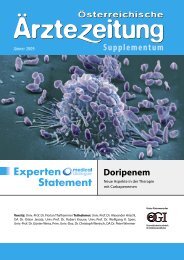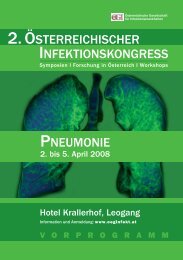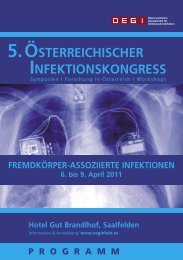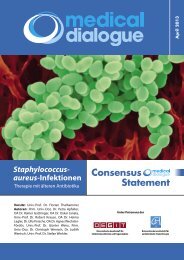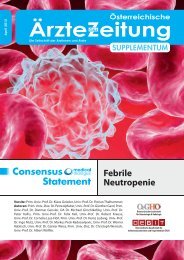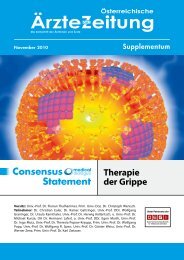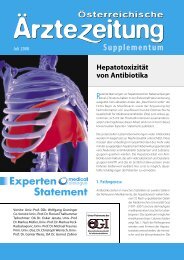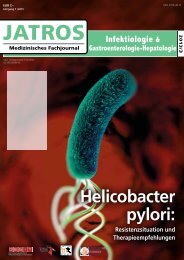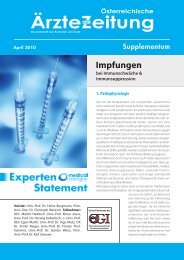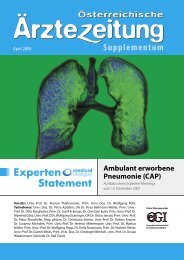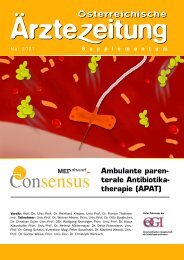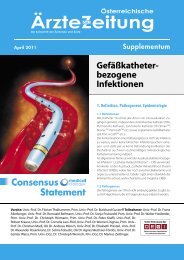Influenza: Aktuelles und State of the Art - Österreichische ...
Influenza: Aktuelles und State of the Art - Österreichische ...
Influenza: Aktuelles und State of the Art - Österreichische ...
Sie wollen auch ein ePaper? Erhöhen Sie die Reichweite Ihrer Titel.
YUMPU macht aus Druck-PDFs automatisch weboptimierte ePaper, die Google liebt.
JATROS Infektiologie 4 I 2011<br />
News and innovations<br />
Is <strong>the</strong> effectiveness <strong>of</strong> acellular pertussis<br />
vaccine in pre-adolescents insufficient<br />
A retrospective, single-center chart review during last year’s Bordetella pertussis outbreak in California<br />
fo<strong>und</strong> that a greater than 3-year interval since vaccination with acellular pertussis (aP) correlated with<br />
increased risk for acquiring <strong>the</strong> disease. Research assistant Maxwell Witt, Kaiser Permanente Medical<br />
Center, San Rafael, California, USA, reported that children between 8 and 12 years <strong>of</strong> age had higher<br />
attack rates and reduced vaccine effectiveness compared with children 2 to 7 and 13 to 18 years, possibly<br />
a reflection <strong>of</strong> greater time since <strong>the</strong>ir last aP dose.<br />
Since <strong>the</strong> replacement <strong>of</strong> whole cell pertussis<br />
vaccine with <strong>the</strong> better-tolerated aP version<br />
in 2002, questions about its efficacy<br />
and durability have lingered [Zhang L et al,<br />
Cochrane Database Syst Rev 2011]. Researchers<br />
at San Rafael Kaiser Permanente (KP)<br />
Medical Center, led by David Witt, MD,<br />
saw <strong>the</strong> California outbreak as an opportunity<br />
to observe aP vaccine performance by<br />
age, time since last vaccine, and vaccine status.<br />
Between March and October 2010, patients<br />
who presented to <strong>the</strong> San Rafael KP<br />
pediatrics department with a severe cough<br />
for greater than one week and a positive<br />
PCR for B. pertussis were considered infected<br />
and included in <strong>the</strong> review. Electronic<br />
medical records were examined<br />
for demographic information and<br />
vaccine status.<br />
Outcomes<br />
In all, 132 patients <strong>und</strong>er 18 years<br />
were included. Vaccination status<br />
among children ≤12 year <strong>of</strong> age at<br />
presentation revealed 85% were<br />
fully vaccinated, 7% <strong>und</strong>er-vaccinated,<br />
and 8% unvaccinated (never<br />
vaccinated). B. pertussis attack<br />
rates were shown to be highest<br />
among 8 to 12 year olds, compared<br />
with 2 to 7 and 13 to 18 year olds<br />
(p=0.002, one sample t-test; Fig.).<br />
Rate <strong>of</strong> pertussis PCR testing per<br />
100.000 person-years<br />
Among children younger than 12, a trend<br />
toward lower attack rates among fully immunized<br />
children vs. <strong>und</strong>er- or never immunized<br />
children was observed, but <strong>the</strong> difference<br />
was not statistically significant. In<br />
contrast, children age 13 to 18 years who<br />
were not fully immunized had significantly<br />
higher attack rates compared with o<strong>the</strong>r<br />
age groups (p=0.009). No patients in <strong>the</strong><br />
cohort were hospitalized or died from <strong>the</strong>ir<br />
illness. Vaccine effectiveness, a metric <strong>of</strong> <strong>the</strong><br />
field performance <strong>of</strong> <strong>the</strong> vaccine, was calculated<br />
by comparing attack rates between<br />
<strong>und</strong>er- and never immunized vs. fully immunized<br />
patient groups. (Of note, effectiveness<br />
should not be confused with efficacy,<br />
Pertussis attack rate and PCR testing rate<br />
30.000<br />
25.000<br />
20.000<br />
15.000<br />
10.000<br />
5.000<br />
0<br />
0<br />
Pertussis attack rate and PCR testing rate per<br />
100,000 person-years<br />
4 8 12 16<br />
Age in years<br />
Rate <strong>of</strong> pertussis PCR testing per 100.000 person-years<br />
Attack rate in cases per 100.000 person-years<br />
which reflects performance in a prospective<br />
placebo-controlled trial.) The effectiveness<br />
<strong>of</strong> aP varied by age group: 41% (95% CI,<br />
21% to 54%) and 79% (95% CI, 73% to<br />
84%) within 2 to 7 and 13 to 18 year olds<br />
respectively, possibly reflecting more recent<br />
immunization, but only 24% (95% CI, 0%<br />
to 40%) in <strong>the</strong> 8 to 12 year age group.<br />
Conclusion<br />
Fig.: Pertussis attack rates were unbiased by testing rates. Peak attack rates observed<br />
among 8 to 12 year olds<br />
4.000<br />
3.500<br />
3.000<br />
2.500<br />
2.000<br />
1.500<br />
1.000<br />
500<br />
0<br />
Attack rate in causes<br />
per 100.000 person-years<br />
The authors concluded that aP is highly<br />
effective within <strong>the</strong> three years <strong>of</strong> administration<br />
after which its protection may diminish.<br />
Should larger studies confirm<br />
<strong>the</strong>se findings, additional scheduled dosing<br />
or targeted vaccine programs<br />
during outbreaks may<br />
be proposed. One attendee,<br />
however, challenged <strong>the</strong> relevance<br />
<strong>of</strong> <strong>the</strong> findings including<br />
<strong>the</strong> use <strong>of</strong> <strong>the</strong> phrase<br />
“vaccine failure”, arguing that<br />
strict case definitions had not<br />
been used. In Dr. Witt’s opinion,<br />
B. pertussis carriage in<br />
<strong>the</strong> face <strong>of</strong> a viral illness had<br />
not been ruled out and <strong>the</strong>refore,<br />
<strong>the</strong>se results cannot be<br />
used to question <strong>the</strong> efficacy<br />
<strong>of</strong> <strong>the</strong> vaccine.<br />
Report: Noelle Lake, MD<br />
I 36<br />
universimed.com



